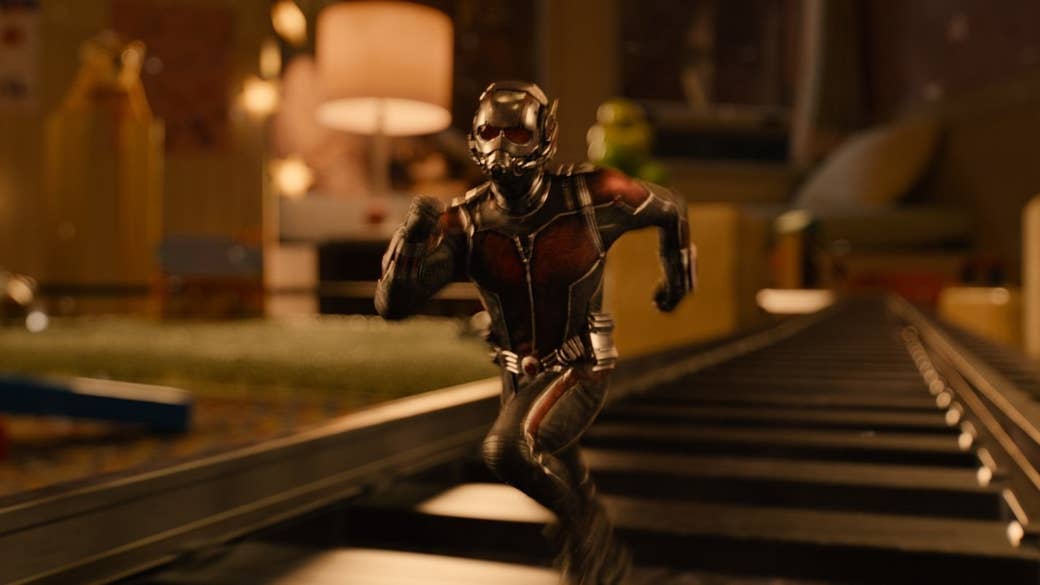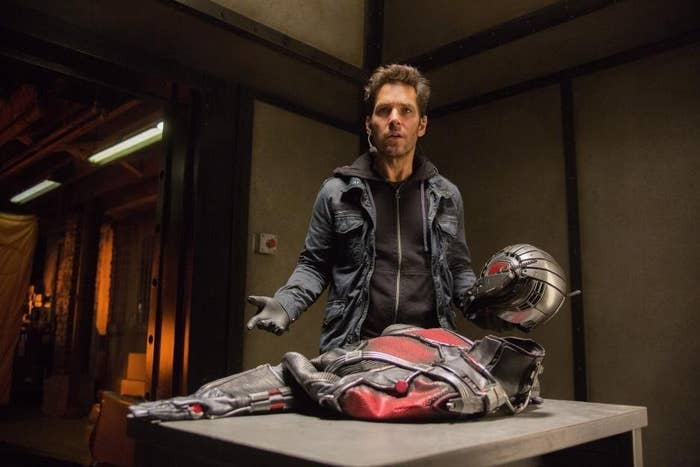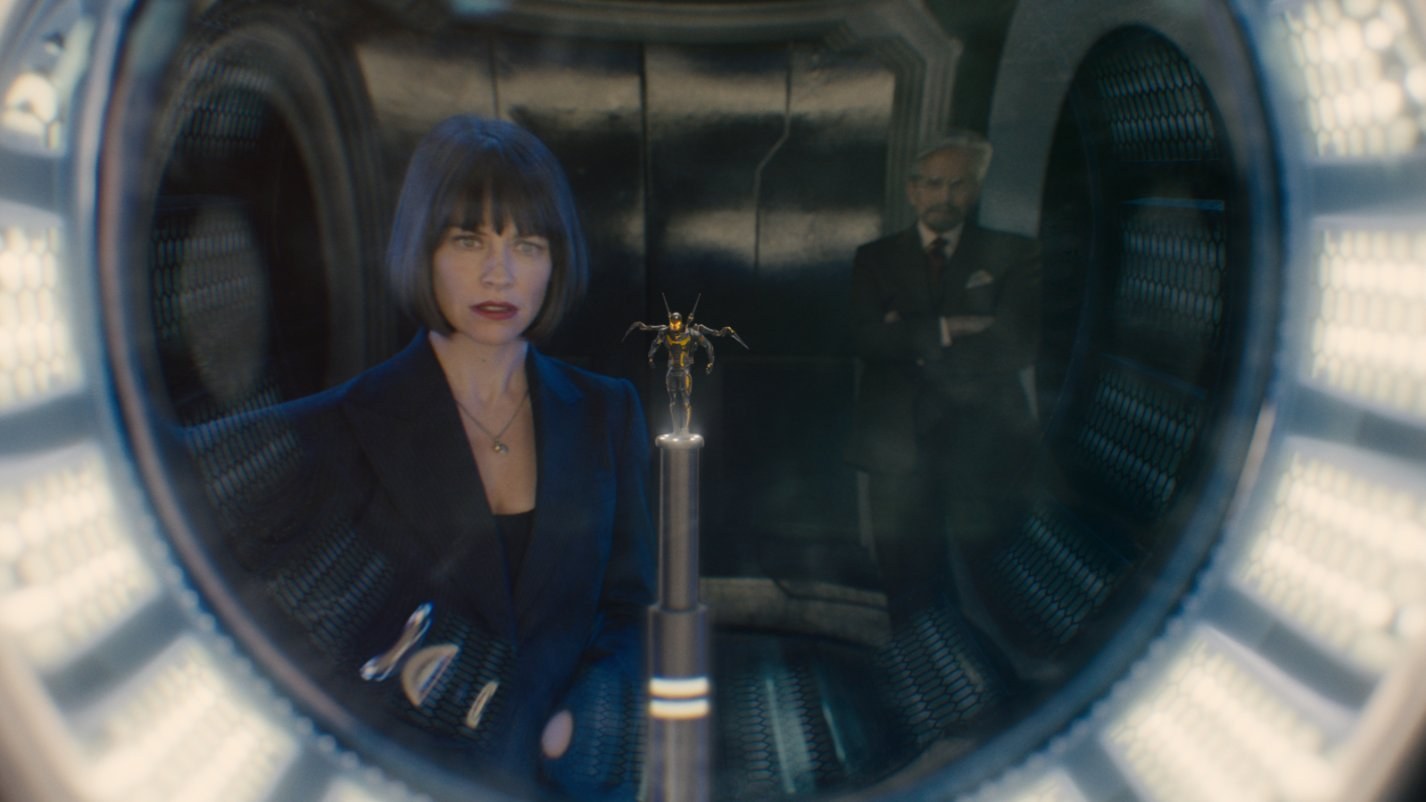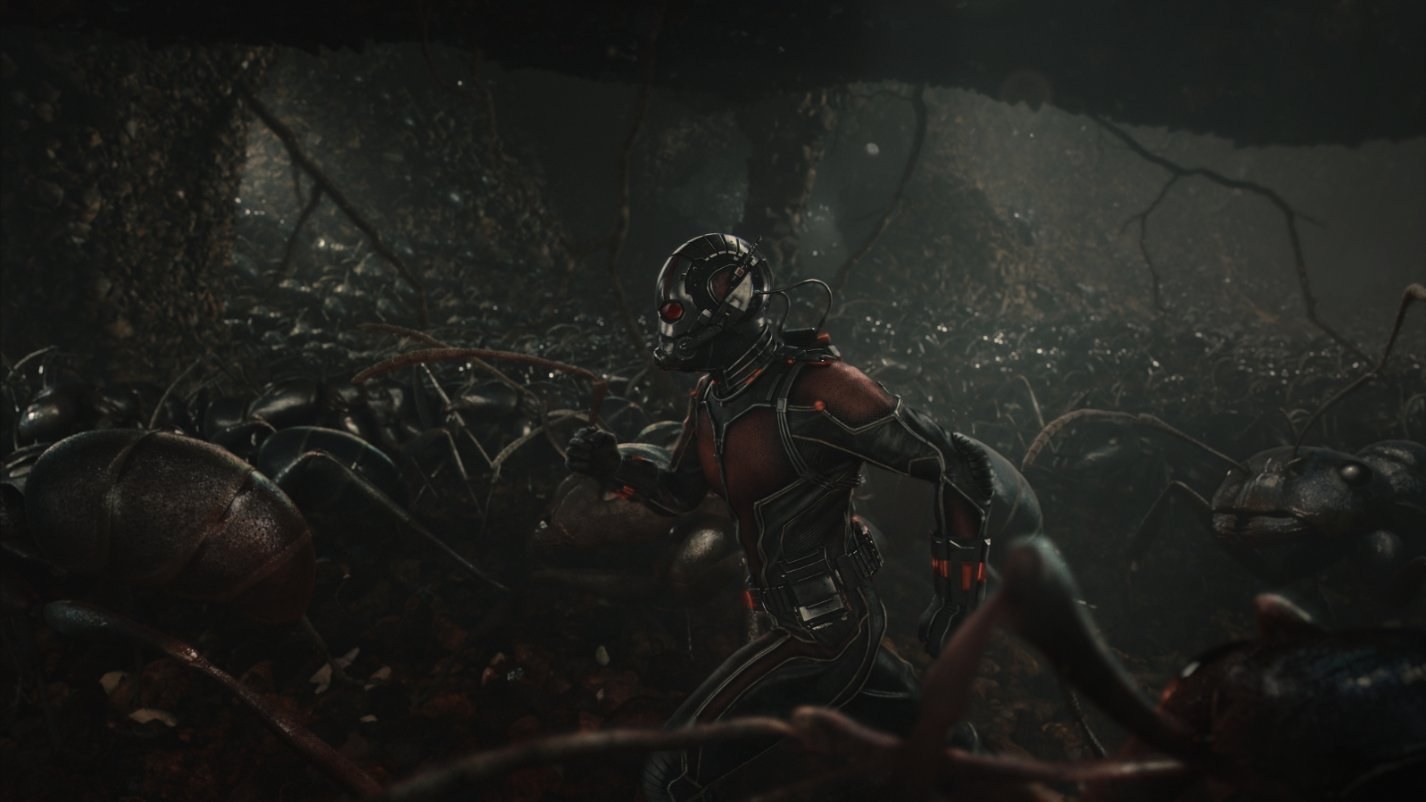
It's become a rule that if you've got a gun hanging on the wall in the first act of your story, then it ought to go off by the third. So it only follows that if you're going to include a shot of a model building in your movie about a shrinkable superhero, then at some point the hero better end up inside or at least in front of it. Let's call it Chekhov's miniature: When Scott Lang (Paul Rudd), having suited up to become Ant-Man's titular hero, ends up dodging fire while scurrying across that tiny courtyard, he's only fulfilling his small-scale destiny.
He's also taking part in a running joke that Ant-Man recounts like someone who's not entirely sure why the punchline is funny, but who's committed to the telling anyway. The joke is that Ant-Man offers up the cinematic equivalent of ukulele covers of the overblown double-neck electric guitar solos that are the standard superhero flick. That scene is an intentionally rinky-dink version of the type of full-size architectural carnage included in every other Marvel movie. Captain America: The Winter Soldier had a helicarrier slamming into S.H.I.E.L.D. headquarters, and Avengers: Age of Ultron had a city being hoisted into the air as a weapon. But Ant-Man? Ant-Man wrecks a model building and a Thomas the Tank Engine train set.

Ant-Man doesn't aim to make fun of superhero tropes, but in its best bits, most of which involve the action sequences that make up its final section, it attempts to partake in them while gently deflating all that continuity-based grandiosity. The reigning blockbuster genre is, after all, built around the idea of bigness. Franchises are driven by the principle of eternal expansion, of new characters always being added and new villains always looming a few installments down the line, promising ever-worse disasters and ready to engage in greater battles each time.
The hero of Ant-Man isn't just literally small, engaging in pint-size set pieces and riding insects, he's thematically minimized as well, an admittedly expendable protagonist who gets swept up in someone else's battle of good and evil, but who's really just hoping to get visitation rights with his daughter. There's even a whole storyline about how he's brought in to take the rightful place of the resentful, better-qualified Hope (Evangeline Lilly), a plot point that manages to apologize for the lack of female-led Marvel movies so far without actually providing one.
The problem the movie runs into is that it, or rather the Marvel Cinematic Universe, needs Ant-Man to be a real superhero as well as a pastiche of one. Rudd, whose eternally boyish likability isn't quite a substitute for Scott's lack of a clear personality, is signed on for multiple movies and is already set to make an appearance in Captain America: Civil War. His character's story is bookended with two bits of MCU tie-in, opening with a ponderous '80s flashback involving Dr. Hank Pym (Michael Douglas, digitally rejuvenated for the scene) and Peggy Carter (Hayley Atwell, aged up) and closing with an after-credits stinger that underlines how tonally different the next MCU installment will be from the one we just watched.

No other Marvel installment has felt as weighed down by its obligations to the franchise — even the arrival of Anthony Mackie as the Falcon, mostly an excuse for an entertainingly choreographed fight sequence, is so unnecessary to the main story that it's hard to remember what justification was forced into the plot to make it happen.
Ant-Man is a hilariously uncool character — his powers are becoming tiny and controlling ants, which suddenly makes being a really good archer look pretty sweet. The uncool factor is, you have to imagine, part of what drew Edgar Wright and writing partner Joe Cornish to the character over a decade ago, when they were pitching a project based around him to Artisan and then Marvel. Wright, maker of wittily wonderful, pop culture-soaked movies like Hot Fuzz and The World's End, was initially set to direct Ant-Man, but made a high-profile exit before it went into production last year. He was replaced by Peyton Reed (The Break-Up, Yes Man).
While it's unfair to fault Ant-Man for not being an Edgar Wright project, Wright, who still shares a writing credit, has left behind so many distinctive touches that you can see the ghost outlines of the movie he never made, one that's fondly familiar with the ins and outs of superherodom but that's just as much about the redemption of a well-meaning ex-con. Reed is an adequate director, but can't get the timing right on scenes like the first one to present Scott, a prison-movie gag that doesn't snap crisply enough to its reveal. And a sequence in which Scott and similarly shrinkable villain Darren Cross (Corey Stoll) accidentally trigger a song on an iPhone while fighting inside a suitcase should be funny and grand at the same time, and instead is just a throwaway bit.

Ant-Man's shrinkage issues are really Marvel's — there's apparently no room for scaling down in the company's big plan, and, unhappily, little to no room for films that feel more like the work of a particular director than like a part of the larger cinematic universe. There's nothing event movie-worthy about Ant-Man on the page, which is part of his charm, and yet Ant-Man gamely strives to be an event movie anyway. Scott Lang's dwarfed by the giant stage on which he's placed, but these days that seems to be the only kind of stage there is.
